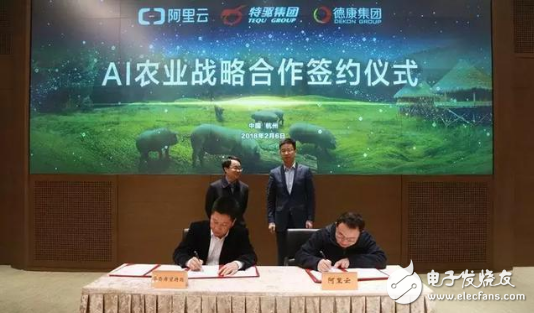Recently, Alibaba Cloud, Sichuan Special Drive Group, and Dekang Group announced a strategic partnership aimed at developing the ET Brain AI technology specifically for the pig farming industry. This collaboration focuses on targeted training and research to eventually bring fully intelligent pigs into the market. According to reports, during the initial phase of theoretical testing, the ET Brain increased the annual production capacity of sows by 3%, while reducing the mortality rate by approximately 3%.

In China, tech giants like Baidu, Alibaba, and Tencent are playing a key role in shaping the next era of artificial intelligence. Alibaba introduced its AI system, the ET Brain, over a year ago. In December last year, Alibaba Cloud officially launched an enhanced version of the ET Brain at the Yunqi Conference. This new version integrates multiple applications, including urban management, industrial optimization, medical assistance, environmental control, and aviation scheduling. The company also unveiled the official logo of the ET Brain during the event.
When it comes to real-world applications, Alibaba's ET Brain has already made several notable strides. One of the most prominent examples is the Smart City initiative powered by the ET Brain.
At the end of last month, Malaysia officially announced that it would adopt Chinese AI technology for the first time to modernize its city infrastructure. They signed an agreement with Alibaba Cloud to implement the ET City solution. As part of this deal, AI will be used across various sectors, including traffic control, urban planning, and environmental protection. The first phase will involve 281 road intersections in Kuala Lumpur, where AI will dynamically adjust traffic lights and detect accidents to improve traffic flow.
This partnership marks the first international "export" of the ET Brain. However, similar projects have been gradually rolling out within China’s cities. For instance, the ET Brain was tested in Hangzhou, where it demonstrated significant improvements in traffic management. According to Wang Jian, chairman of Alibaba's Technical Committee, managing transportation in large cities is a major challenge. The "City Brain" system uses AI to process and optimize data from cameras and traffic signals every day.
In 2016, a pilot project was launched in Xiaoshan District of Hangzhou. The system first gathered data on the number of vehicles in the city—there were about 1.2 million cars, but even after restrictions, there were still 1.2 million on the roads. By adjusting traffic lights in real-time based on traffic flow, the system reduced average travel time on elevated roads by 5 minutes and improved speeds on regular roads by 15% to 20%.
Recently, citizens in Chenzhou began to see changes as well. With the help of the ET Brain, Ganzhou City developed the overall structure of “Four Nets and One Brain.†This model aims to integrate different systems for more efficient city management.
It's hard to imagine what the future ET Brain will look like, but as Wang Jian explained, cities are the largest intelligent hardware ever created by humans—but they're still equipped with limited intelligence. To solve complex urban challenges, cities must leverage data resources and AI to become smarter and more efficient. The ET Brain represents a step toward that vision, transforming how we live and interact with our environments.
Flat Wire Common Mode Inductors
Flat Wire Common Mode Inductors,Vertical Low Profile Common Mode Inductors,Horizontal Flat Wire High Current Inductor,Flat Copper Wire Common Mode Inductors
Shenzhen Sichuangge Magneto-electric Co. , Ltd , https://www.scginductor.com